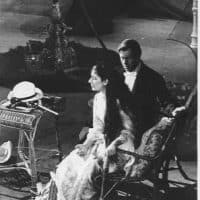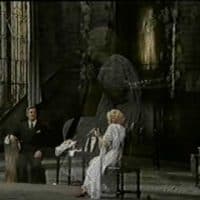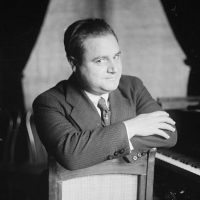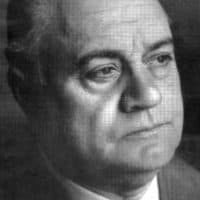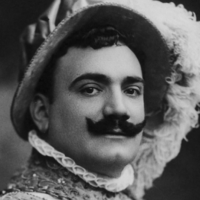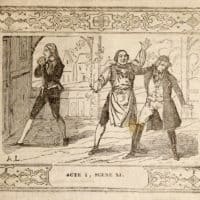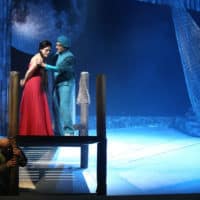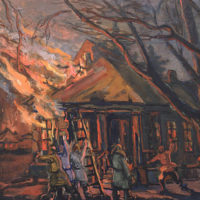 Born as Herle on 28 August 1927, Bucharest, he discovered his talent by fortune as he tells in an interview. He caught a very bad cold and he needed light surgery, but the doctor, being familiar with singers, noticed he had exceptional vocal cords and did not intervene. After that episode, he started singing, training himself as a tenor. In 1945 he succeeded in getting admitted at the Astra Conservatory and met Prof. Costescu Duca who became his mentor. Mr. Duca was himself an acclaimed baritone in Bucharest, but Herlea never had the chance to hear him live due to his age. Herlea turned to the baritone repertoire and continued his studies at the Ciprian Porumbescu Conservatory.
Born as Herle on 28 August 1927, Bucharest, he discovered his talent by fortune as he tells in an interview. He caught a very bad cold and he needed light surgery, but the doctor, being familiar with singers, noticed he had exceptional vocal cords and did not intervene. After that episode, he started singing, training himself as a tenor. In 1945 he succeeded in getting admitted at the Astra Conservatory and met Prof. Costescu Duca who became his mentor. Mr. Duca was himself an acclaimed baritone in Bucharest, but Herlea never had the chance to hear him live due to his age. Herlea turned to the baritone repertoire and continued his studies at the Ciprian Porumbescu Conservatory.
Later he participated at specialization courses at the “Accademia di Santa Cecilia” in Rome under Maestro Giorgio Favaretto. He started performing from 1948, but his operatic debut came on 14th of April in 1950, as Silvio in Pagliacci at the Romanian National Opera of Bucharest. Within short time he became a soloist and took on all major baritone roles, but the way to the west and the grand opera stages was blocked by the communists. The artist himself said that it was a miracle he succeeded in west. Many other very good singers from the east did not get this opportunity. To give you an idea of how hard the times were during the ’50s in Romania, I will just say that many soloists were made redundant from at the Romanian National Opera: baritone Serban Tassian, tenor Dinu Badescu and soprano Valentina Cretoiu. Other Romanian opera singers chose to leave: sopranos Mariana Nicolesco (she was lucky to get out early and had a successful career at the Met), Ileana Cotrubas, Marina Krilovici, Viorica Cortez, Leontina Vaduva, Nelly Miricioiu; tenors Ion Buzea, Ioan Piso; baritone Eduard Tumageanian. Singers like soprano Virginia Zeani, tenors Petre Munteanu and Tomel Spataru began their studies outside the country and remained there. The situation was similar in all communist countries (Russia, Poland, Czech, Hungary, Bulgaria, etc.).
The first big success outside Romania was at the Bolshoi Theatre in Moscow in 1958 (after which he was was invited to sing many times there). An important step in his international career was his debut at Covent Garden in “Il Barbiere Di Siviglia” and “Le nozze di Figaro” opposite Teresa Berganza. Both performances were a huge success and opened the way to La Scala. Here is the press comment on Herlea’s debut at Covent Garden:

“Covent Garden has found a new and immense Figaro in Nicolae Herlea. With a voice so rich and smooth that it made one think of brown velvet, his style – roguishly debonair – and his inexhaustible gusto … have dominated the performance. Herlea has everything that belongs to Figaro: the nimbleness, the verve, the mischievous jollity, the invulnerable self-possession, in brief, the personality of one of nature’s masters of resource.”
The La Scala debut came in 1963 in “Don Carlos” as Marquis, under Gabriele Santini, also a triumph. The artist himself recalls this debut as being unique, because La Scala is the only great theatre that require an audition, no matter how famous the singer is. As a detail, he was the one that spoke with Siciliani (the La Scala director in those times) to receive for an audition the unknown tenor named Luciano Pavarotti. Two years later, Pavarotti debuted as the Duke gaining his popularity.
He was a member of the Metropolitan Opera from 1964 to 1967. His performance of “La Forza del Destino” in 1966 in particular is remembered, as it was the revival of this opera at the Met. Forza had not been staged after Warren’s death on the stage in 1960 (third act on March 4, 1960); Herlea was the one who assumed the role. After this huge success, he sang Rigoletto with Corelli, and Lucia di Lammermoor with Sutherland. Also Corelli and Herlea sang together in his Don Carlos debut, under Kurt Adler’s conduction. Herlea always had words of admiration for the great tenor, but he also declared his voice better suited with Bergonzi. They sang together many times in “La Forza Del Destino,” which seemed to be a successful combination at the Met. He also did Otello with the great Mario Del Monaco.
He married in 1969 to Simona, a gynecologist and they had two sons: Robert Nicolae (who owns his personal website) and Filip Anton. After retiring from the stage, he led master classes, specialisation courses at the Academy of Music in Bucharest and was the president of the jury of the Hariclea Darclée – Foundation.
In 1983, Simona relocated to Germany. During the last years of his life, he lived in Germany with his wife and sons. He died in Frankfurt on February 24’th 2014, at the age of 86.
Prizes
The maestro’s respect for the older generation of singers is well known. He remembers singing Tonio in Berlin together with the great tenor Helge Rosvaenge. Here are his words:
“I remember very well a Pagliacci in East Berlin featuring the great tenor Helge Rosvaenge as Canio. He may have been in the fall of his career, but to sing next to a living legend like that was quite an experience for a young baritone. Especially since I was still studying at the Conservatory.”
The artist received at the age of 35 (in 1962) a supreme distinction from the romanian state, that is the title “Artist Of The People.” He has been awarded some important international prizes, or titles, like:
- Golden Medal and Grand Prize at the 1954 Prague Spring Festival
- Laureate of the 1955 International Canto Contest in Geneva
- Golden Medal and Grand Prize at the 1957 Canto Contest in Verviers
- Giuseppe Verdi Golden Medal in Milan (1963)
- Key of The City Detroit
- “Golden Record” for his musical activity and for the collaboration during 40 years with the record company “Electrecord” (2002, August 28th).
- “State Prize” (1964)
- Order “Meritul Cultural” (1968)
- Order “Republic’s Star” (1971)
- Order “Romanian star – commander degree” (1999)
By giving this high distinction, the communists authorities acknowledge Herlea’s contribution to the cultural development in Romania.
Stage performances

Some of his memorable performances were “Il barbiere Di Seviglia” with Fiorenza Cosotto at La Scala, Tonio in “I Pagliacci” at the Met, and “Tosca” in Tokyo in 1972 with Monserrat Caballé. Here the artist declared that he always regretted never having been able to sing with Callas, as he came too late to Europe. The Tosca in Tokyo was supposed to have been sung opposite Callas, but the diva cancelled in the last moment, so Caballé stepped in. Another grand performance is Faust at La Scala with Nicolai Ghiaurov as Mefistofeles and Nicolai Gedda as Faust. His relationship with Nicolai Ghiaurov was very warm, they became friends and sang together many times. Herlea was also good friends with tenor Luigi Alva, due to the many Barbieres they made together.
Being asked which was his favorite role, the artist declared surprisingly that it was Rigoletto, even if he sang Figaro about 550 times in his career! (This might be an absolute record).
Herlea’s voice was very well suited for major dramatic roles. Having a bronze timbre, vibrating top note and an admirable technique, Maestro Herlea gave unprecedented shades to Verdi’s characters. Many critics had nothing but words of admiration about him, saying he was born to sing Verdi.
His Rigoletto is an exceptional combination of a sweet voice with beautiful pianissimo when talking to his beloved daughter Gilda, or becomes fearful and threatening in Pari siamo, planning the revenge against the Duke. Than he finds himself as a weak old, man, humiliated in front of the cortigiani. Every time he climbed on the stage he simply dominated the representation by his impressive presence, being an excellent actor.

His Scarpia is considered by many as one of his hallmarks, due the heritage video recording of Tosca with Caballé in Tokyo, 1975. There is an integral audio recording of Tosca with Zeani and Fanateanu which features both Herlea and Zeani in their primes.
Herleas also exceeded as Tonio, the evil clown from Pagliacci which builds, in my opinion, the whole plot of the opera. Maestro Herlea plays and sings Tonio in a way you cannot forget. In his hands, the character becomes a fearful man animated by his love to Nedda to the edge of madness that further drives the plot ending.
His repertoire included all the major verdian roles. As he was praised as Rodrigo, less is known about his performances in Ernani, Otello, Il Trovatore, or La Forza del Destino, due to scarce recordings.
Appreciation
Even if he is now considered one of the most important figures in opera of all times, Mr. Herlea was modest about himself:
“I never felt like a star. I am a modest person with a natural vocal gift that I am very much aware of. My belief is that true talent doesn’t need artificial publicity. Music didn’t start with me, nor will it end with me. I was never attracted to the glitter and glamour of showbiz,” he declared in an interview.
The reputed romanian writer Mircea Horia Simionescu said about Mr. Herlea:
“When famous critics often throw away their analysis tool only to acclaim Herlea’s electrifying power, that charms and dominates the ones listening to him, when the most famous publications are talking of “the Herlea phenomenon,” it is obvious that all we understand and love about his universally appealing voice.”
Colleagues on Herlea:
– Carlo Bergonzi: “A Nicolae Herlea, con multi auguri e per ricordo del nostro primo Rigoletto a Metropolitan Opera.”;
– Mario Del Monaco: “A caro collega Herlea, con sincera stima il ricordo del nostro Otello.”;
– Monserrat Caballé: “Per Nicolae Herlea con grande affetto ed ammirazione.”;
– Franco Corelli: “Caro Herlea sei stato meraviglioso nel tuo debuto in Posa. Auguri per futuro. Tuo colega Franco Corelli.”
– Giuseppe Di Stefano: “A Nicola grande TONIO e SCARPIA ammirazione ed sincera amicizia auguri.”
– Kurt Adler: “A mio amico, il eccelente baritono N. Herlea, con ammirazione.”;
– Nicolai Gedda: “A Nicolae Herlea pel bel ricordo di suo amico. E del nostro FAUST ala Scala di Milano.”;
– Nicolai Ghiaurov: “A caro amico Nicolae Herlea, dal tutto il cuore.”;
– Tito Gobbi: “A caro ed ilustre colega ed amico Nicolae Herlea per ricordo. Con molti auguri.”;
– Luigi Alva: “A Nicola, ottimo collega e migliore amico, con il piu vivo auguri di sempre maggiori succesi e l’incondizionata amicizia.”
Video recordings
The only thing we can regret about this great singer is that he never came to record his memorable performances on the world’s greatest stages. Fortunately he still recorded much of his work in Romania with the Romanian National Opera of Bucharest. There are also some video recordings:
- “Tosca” in Tokyo with Caballé and Di Stefano (1975)
- “Andrea Chenier” / TV-Film 1971 / Cornel Stavru tenor, Mariana Nistor-Slatinaru soprano, Nicolae Herlea baritone
- “La Forza del Destino” / TV-Film / Mariana Nistor-Slatinaru soprano, Ludovic Spiess tenor, Nicolae Herlea baritone
- “Rigoletto” / TV 1984 / Silvia Voinea soprano, Octavian Naghiu tenor, Nicolae Herlea baritone
- “Il Barbiere” / Film 1983 / Silvia Voinea soprano, Valentin Teodorian tenor, Nicolae Herlea baritone
- “La Traviata” / TV 1984 / Vasile Moldoveanu tenor, Octavian Naghiu tenor, Nicolae Herlea baritone
- “Un Ballo in Maschera” / Film 1987 / Silvia Popp soprano, Ludovic Spiess tenor, Nicolae Herlea baritone.
- “Lucia Di Lammermoor” / Film 1985(?) / Silvia Voinea soprano, Florin Georgescu tenor, Nicolae Herlea baritone.
Epilogue
Nowadays, in the era of Youtube, Facebook and other social media sites, it is infinitely easier to listen to his performances. Ten years ago, when I wrote this article, recordings were challenging to find. I thought adding a list of appreciations from other opera singers and wanted somehow to convince the readers that he was great. I don’t know how relevant this still is now for the modern reader, the voice speaks/sings for himself, there is no need to convince anyone about anything. Just search Youtube for his recordings and read the comments; they inspire hope that he will never be forgotten. Here he sings a wonderfully dramatic and thunderous “Cortigiani”, from Verdi’s Rigoletto:
– nicolaeherlea.com; all references are obtained with written permission from the site editor, Robert Herle, Nicolae Herlea’s eldest son.
– CD cover information “Nicolae Herlea – opera arias” Electrecord, 2003
– Interview with Rene Seghers taken in Amsterdam, 2002
– Many thanks to Dragos Tomescu for adding some extra information and corrections to the article.
